Ghanaian Workers Describe Abuse Aboard Trawlers
ADF STAFF
The video shot aboard an industrial Chinese trawler fishing in Ghanaian waters was graphic.
Obtained by the Environmental Justice Foundation (EJF), the footage began with the loud wails of a man off camera. A trawl cable had snapped, severely injuring his legs. As the camera zoomed in, he slapped his hands against the metal slab he was laid across.
There was no medicine or medical personnel on board. By the time the trawler made it back to port, the man, a Ghanaian fisherman, was dead.
Fishing is one of the world’s most dangerous professions, but Ghanaian workers told EJF that they commonly suffer from physical abuse, lack of drinkable water, low wages and long working hours that sometimes stretch to 24. Fearing retribution, the workers spoke anonymously.
“We have been complaining, but we do not have the power to stop it,” a fisherman told EJF. “As soon as you board the boat, you are under their control. [If we speak up], they will sack us all when we come back to port. Sometimes when they sack you, they will tell other companies not to employ you.”
Foreign ownership of trawlers is illegal in Ghana, but Chinese trawlers use Ghanaian front companies to fish. According to EJF, about 90% of industrial trawlers in Ghana are financed by Chinese companies.
The Ghanaian fishermen described ruthless treatment at sea.
“Every time we are pulling the fish in, the captain would hit those who aren’t fast enough,” one fisherman told EJF. “He would take his boot, a stone or anything else, and hit you with it.”
Chinese crew members sleep in cabins, but Ghanaian workers are left to sleep on deck — under tarpaulins that offer little protection against the elements. They suffer stomach issues from drinking boiled sea water and often are slapped or kicked awake when they try to sleep.
“Sometimes, our supplies [are gone] after 21 or 22 days of sailing,” a fisherman said. “Sometimes, we are left with only gari [cassava root]” to eat.
The workers said they do not work under contract and are paid a flat rate, no matter how long they are at sea or how much fish they catch.
“They do what they want,” another fisherman said. “They know we do not have any other job, so there is no choice but to work for them.”
Such treatment is common aboard Chinese trawlers throughout West Africa, said Peter Hammarstedt, director of operations for Sea Shepherd Global, which works with African governments to fight IUU fishing. The worst conditions he ever saw were aboard a Chinese-owned trawler fishing off The Gambia in 2019.
The vessel was staffed by Sierra Leonean fisherman who stayed in cramped, squalid quarters between the engine room and wheelhouse.
“On that same ship, we treated one of the Sierra Leoneans for a foot infection that had been left untreated for so long that our medical officer believed that he would have potentially lost it were it not for our boarding and inspection,” Hammarstedt told ADF in an email.
The Ghanaian fishermen told EJF that Chinese trawlers typically use an illegal double-netting system to catch smaller fish such as sardinella and employ the banned practice of saiko in which a catch is transferred from a trawler to a large canoe capable of carrying about 450 times more fish than an artisanal fishing canoe.
Ghana’s waters are now being depleted.
In Gomo Fetteh, a fishing community in central Ghana, artisanal fishermen said they sometimes go days without catching anything.
“Twenty years ago, when we talk about small-scale fishers, it was a booming industry,” Nana JoJo Solomon, executive member of Ghana’s Canoe Council, told EJF. “In the last 10 to 15 years, we have not seen a bumper season. Gradually, we are losing our livelihoods. With the coming of these industrial fleets, we realized that almost everything is gone.”


Comments are closed.